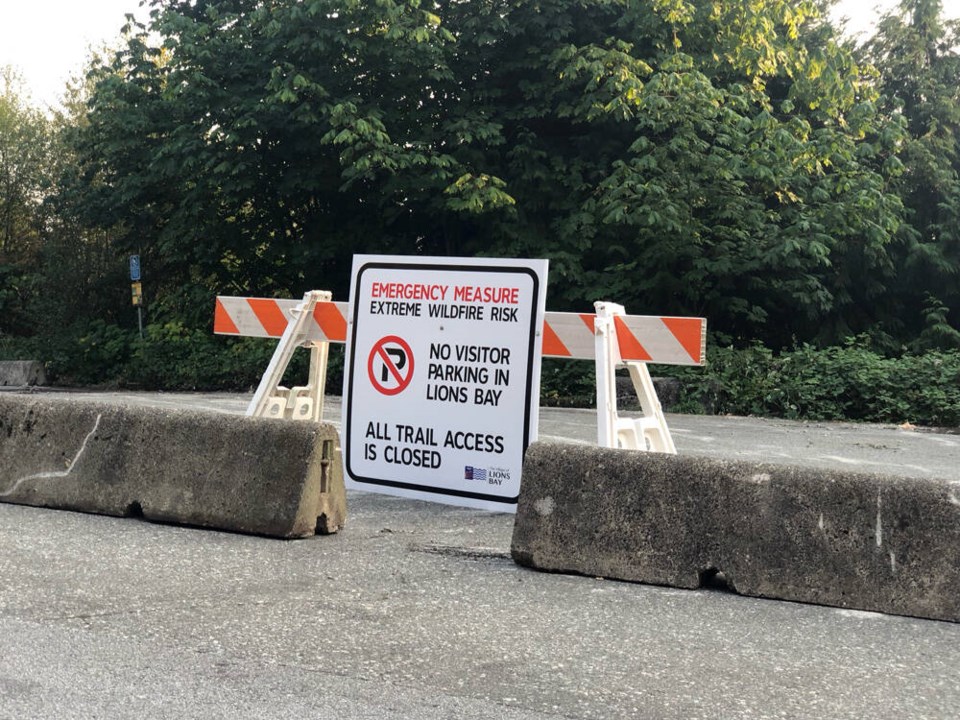Trailheads leading to popular hikes above the community of Lions Bay will remain closed, after the village council flip-flopped Thursday on an earlier decision to re-open them.
A majority of council members voted at a special meeting to keep the trailheads and parking areas on municipal land closed to the public, despite comments from the village fire chief that there is currently no exceptional fire risk in the forest around Lions Bay and no particular risk posed by hikers.
Last week, the village council made the unusual decision to close the trailheads and parking areas, citing dry conditions and risks of potential wildfire close to Lions Bay.
Outdoors advocates questioned that decision, saying hikers do not pose a fire risk and are frequently the people who first spot fires in the forest.
Trailheads to several popular hikes, including Tunnel Bluffs, the west Lion, Centennial Trail, Brunswick Mountain and Mount Harvey start in Lions Bay.
Following rain at the beginning of the week, council voted to re-open the trailheads in time for the Labour Day weekend, "subject to input from staff experts."
But in a split decision Thursday, council reversed course again, voting to keep the trails closed for now.
Instead, council opted to review the trailhead status at weekly meetings.
The decision came after several members of the public urged council not to act hastily in re-opening the trailheads.
“It’s really dry,” said Tamara Leger. “I don’t think this coming weekend is the right time to open up.”
That assessment wasn’t shared by Lions Bay Fire Chief Barrett Germscheid, who told council keeping everyone out of local trails wasn’t a “feasible direction to go.”
Hikers report more fires than they ever start, said Germscheid, adding, “There have been no hiker-started fires in the past eight years.”
Germscheid said extreme fire risk is usually when temperatures are over 30 degrees and humidity is below 30 per cent.
Currently, “(Temperatures) are not high enough, it’s not dry enough,” he said. “We’re not in extreme fire risk.”
Phil Folkersen, the Lions Bay Emergency Program Coordinator, said while he thought it was the right decision to close the trailheads, in most other communities the decision to close trails is made by staff based on certain criteria, rather than being a political decision.
If other areas all have trails and trailheads open “and we don’t and we don’t have criteria for why, we’re going to be in trouble,” he said.
“Politically speaking it’s not going to be popular to be closed over the long weekend when there’s rain and cooler temperatures.”
The three councillors who voted Thursday to keep the trails closed said they thought it would be better to be cautious, saying they were still concerned about fire danger.
Several residents who tuned in to the meeting praised council following the decision.
Others offered criticism.
Ehsan Monfared said he was “incredibly disappointed” with the decision to keep the trails closed.
“You’re not listening to the advice of experts,” he said.
Monfared said the decision cements the community’s reputation as a group of NIMBYs who will use any excuse to keep people out.
Lions Bay resident Pieter Dorsman who attended the meeting said he shared that disappointment.
“The fire chief was pretty clear that trails could be open again,” he said.
Dorsman said he sees the issue as a reflection of longstanding divisions in the community.
“There’s lots of people coming to hike here, and there’s a group here that wants to close the gates to Lions Bay,” he said. “Lions Bay has a reputation for this. And it’s not good.”
Dorsman said a number of hikers have continued to use the trails this week, despite the official closures.
The Ministry of Environment, which oversees BC Parks, declined to comment on the decision.




